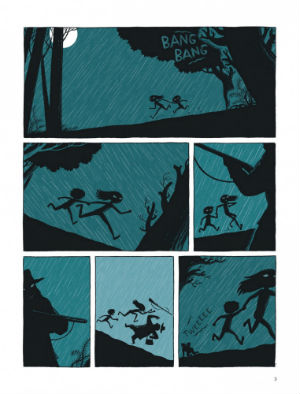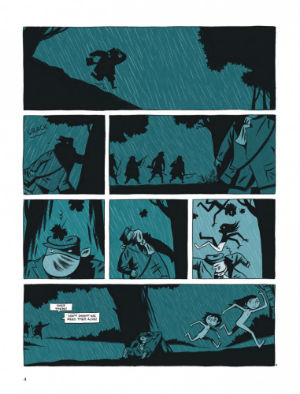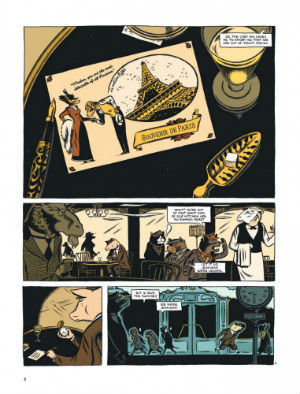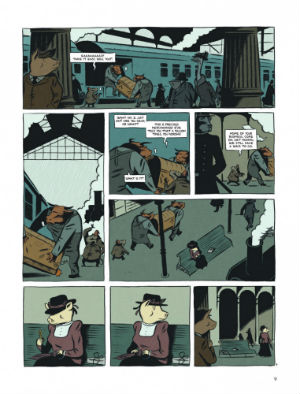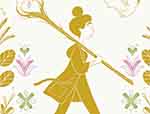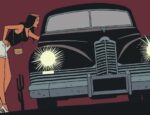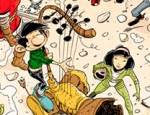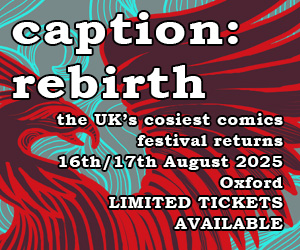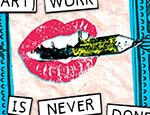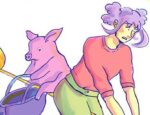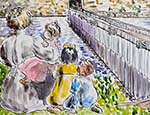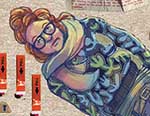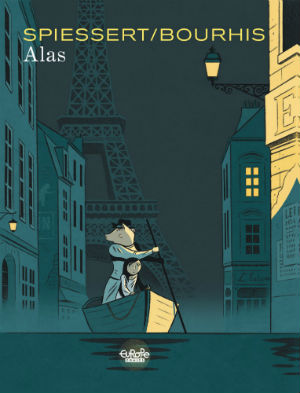 Hervé Bourhis turns the tables in this cleverly devised plot in which we are kept on our toes until the very end. Alas paints an alternative reality surrounding the Great Flood in 1910 Paris: in this reality, animals are in charge and humans are a mysterious and rare species. Humans are hunted, studied, and mythologised by their animal superiors in both dramatic and emotive scenes brought to life by Rudy Spiessert’s bold lines and high contrast panels.
Hervé Bourhis turns the tables in this cleverly devised plot in which we are kept on our toes until the very end. Alas paints an alternative reality surrounding the Great Flood in 1910 Paris: in this reality, animals are in charge and humans are a mysterious and rare species. Humans are hunted, studied, and mythologised by their animal superiors in both dramatic and emotive scenes brought to life by Rudy Spiessert’s bold lines and high contrast panels.
Bourhis perfectly walks the line between showing and telling, allowing for the readers participation in this story: we piece together this dystopian-style narrative without the need for any excessive exposition. Alas follows the journey of two human children, Leaf and her brother Spring, who are captured by poachers who want to sell them on without much thought about what will happen to them after that. The animal world is revealed to us as we follow Leaf, who is passed through the hands (or paws, perhaps) of various animals with various nefarious motives.
Meanwhile, Spiessert’s highly textured lines add a softness to the otherwise bold strokes and high contrast of the panels; just as the comic notes of absurdity in this world help add a lightness to its more foreboding messages and darker undertones. Similarly, colourist Mathilda manages to capture the shifting moods of scenes through the sudden interjection of bold colours. These are emphasised by their contrast to the prevailing palette of greys, blues and dirty browns. This colour scheme consequently reflects the rising levels of the flood water and the rising tension of the developing situation. The flood becomes equally pervasive because of this palette, highlighting further the sudden bursts of red or orange used to emphasise moments of action or emotion.
Indeed, despite its animal characters and the frequent exploitation of animal-based puns, Alas is filled with very human matters of love, loss and empathy. In spite of their animal forms, the humanity of the characters still shines through so that these bodies are even forgotten, or rather become unimportant. In doing this, Bourhis prompts the reader to reconsider their anthropocentric view of society and reflect upon the commonalities between species and how we are all just trying our best to survive.
This creates an epic graphic novel which manages to both entertain and fascinate at once; forcing us to confront the privileged position we have claimed for ourselves and to wonder if any other species would have done the same thing given their chance.
Hervé Bourhis (W), Rudy Spiessert (A) Mathilda (C) • Europe Comics, €7.49
Buy digital copies online here
Review by Rebecca Burke





